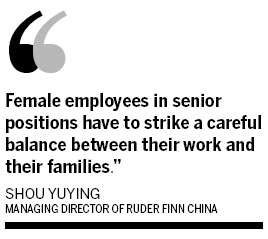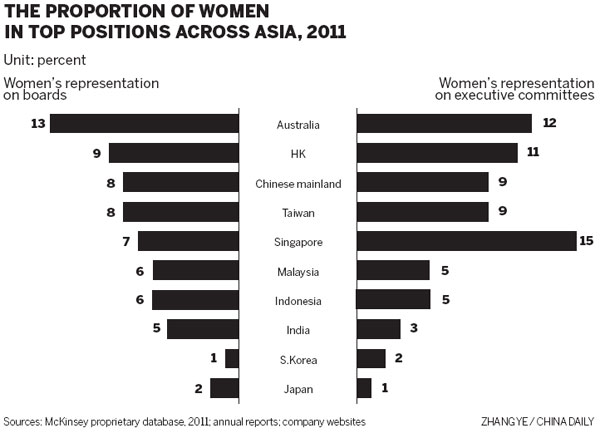Women could supply needed talent to labor market
Corporations in Asia, especially in China, are failing to tap the huge reservoir of talented women to combat the region's talent shortage, according to a report released by the management consultancy McKinsey & Company Inc on Monday.
The report, Women Matter: An Asian Perspective, relies on data collected over five years and is the first detailed study McKinsey has published on women in Asian companies.
Taking part in the poll were 1,500 senior managers from 744 Asian companies tracked by stock indexes in 10 Asian markets, including 90 companies in the Chinese mainland. They answered questions related to the gender composition of their boards of directors and executive committees.
About half of all graduates in Asia are women and only a fraction of those climb their way into middle-management positions in their careers, not to mention top ones, the study said.
"Given tight labor markets and intense competition for talent across Asia, there is a strong business imperative for Asian companies to better tap the female talent pool, which means that gender diversity needs to become a corporate priority," said Claudia Sussmuth-Dyckerhoff, a writer of the report and a director in McKinsey's Shanghai Office.
Of the Chinese companies surveyed, women hold 6 percent of the seats on their corporate boards and 8 percent of those on their executive committees.

"Even when women do enter the corporate world, they often don't go very far," said Wang Jin, a partner in McKinsey's Shanghai Office, who also worked on the report.
"They tend to either get stuck in the pipeline early in their careers or they decide to leave after reaching a middle-management position."
A separate McKinsey survey in China recently revealed that 44 percent of the executives in 60 Chinese companies think that a lack of talent was the biggest barrier to their companies achieving their global ambitions.
In its latest research, the McKinsey Global Institute projected that China will be short of 23 million highly skilled workers in 2020.
"Bringing more women into the workforce would help eliminate that lack, which I think is essential at this moment," Wang said.
Forty percent of the business leaders surveyed said women seldom rise to senior positions at businesses because they are saddled with a "double burden" as they try to both do their jobs and look after their families.
"Female employees in senior positions have to strike a careful balance between their work and their families, but their talents in communications and detail work shouldn't be ignored," said Shou Yuying, the managing director of the public relations firm Ruder Finn China.
The McKinsey Asia survey also suggested that only 12 percent of companies have adopted a diversity program meant to promote women's participation at the more senior levels of management.
Very few of them appeared to have strong commitments from CEOs and other senior executives, and only 15 percent of the survey respondents said that CEOs and executive teams in their companies monitored the results of such programs.
"Like any major change program, securing greater participation by women at senior levels of a company requires CEO commitment and recognition throughout the company of the importance of gender diversity," said Sussmuth-Dyckerhoff.
yuran@chinadaily.com.cn

(China Daily 07/03/2012 page14)








